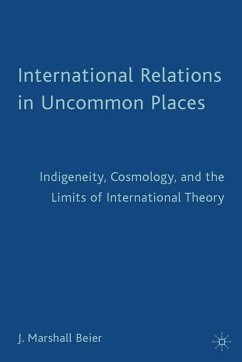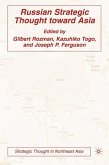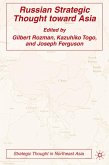The central claim developed in this book is that disciplinary International Relations (IR) is identifiable as both an advanced colonial practice and a postcolonial subject. The starting problematic here issues from disciplinary IR's relative dearth of attention to indigenous peoples, their knowledges, and the distinctive ways of knowing that underwrite them. The book begins by exploring how IR has internalized many of the enabling narratives of colonialism in the Americas, evinced most tellingly in its failure to take notice of indigenous peoples. More fundamentally, IR is read as a conduit for what the author terms the 'hegemonologue' of the dominating society: a knowing hegemonic Western voice that, owing to its universalist pretensions, speaks its knowledge to the exclusion of all others.
Hinweis: Dieser Artikel kann nur an eine deutsche Lieferadresse ausgeliefert werden.
Hinweis: Dieser Artikel kann nur an eine deutsche Lieferadresse ausgeliefert werden.
'This engaging and analytically sophisticated text is one of the most original, insightful and transformative contributions to recent debates. Beier deftly weaves indigenous and 'undisciplinary' knowledges to expose the complicity of IR theorists - even critical theorists - in advanced colonialism. Better yet, he moves beyond critique. Advocating a more nuanced form of conversation - 'not in the interest of the Other alone' - he also demonstrates how his development of postcolonial theory, informed by an ethics of responsibility, enables more productive and emancipatory possibilities. This bold, courageous, and elegantly argued book warrants reading by all IR theorists.'- V. Spike Peterson, University of Arizona, USA
'International Relations in Uncommon Places challenges us to expand where we look for international relations, how we look for it, and the voice(s) we use to speak of it. Acutely aware of his own voice and privileged position as a western academic, Beiercalls our attention to a marginalized people and a marginalized way of seeing and 'knowing,' that may offer an important corrective to what he refers to as the "hegemonologue" of dominant western voices.'- Roxanne Lynn Doty, Associate Professor, Department of Political Science, Arizona State University, USA
'International Relations in Uncommon Places challenges us to expand where we look for international relations, how we look for it, and the voice(s) we use to speak of it. Acutely aware of his own voice and privileged position as a western academic, Beiercalls our attention to a marginalized people and a marginalized way of seeing and 'knowing,' that may offer an important corrective to what he refers to as the "hegemonologue" of dominant western voices.'- Roxanne Lynn Doty, Associate Professor, Department of Political Science, Arizona State University, USA








